In today’s fast-paced and highly demanding work culture, individuals often work long hours, sometimes even sacrificing their personal lives for their careers.
Working long hours on your feet can take a toll on your body, especially your feet. Foot care is essential to maintain healthy and happy feet. It’s not only about addressing foot problems but also about taking steps to prevent them from happening in the first place.
Here, we will discuss why regular foot care is essential and ten effective foot care routines for individuals working long hours on their feet. We will also address common foot problems such as corns and calluses, sweaty feet, and odour. And we will talk about when you should see a podiatrist to care for your feet. So put your feet up, grab a cup of tea, and let’s get started!
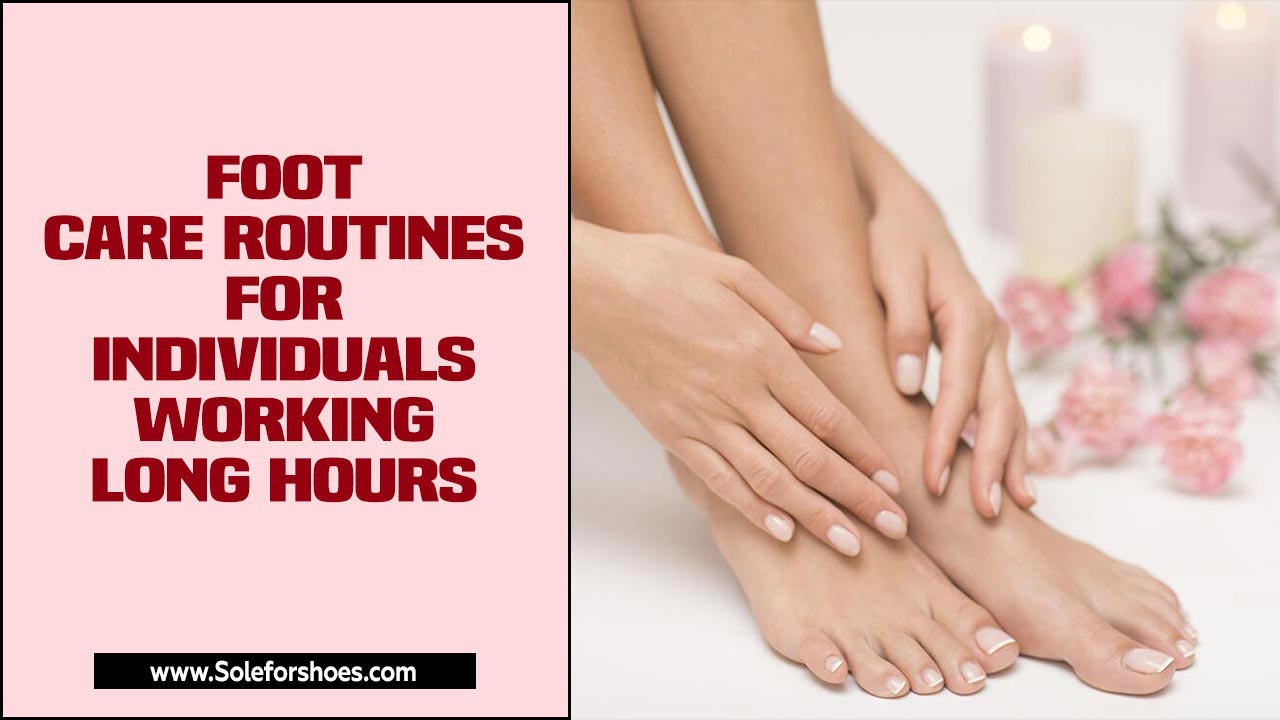
Why Regular Foot Care Is Essential
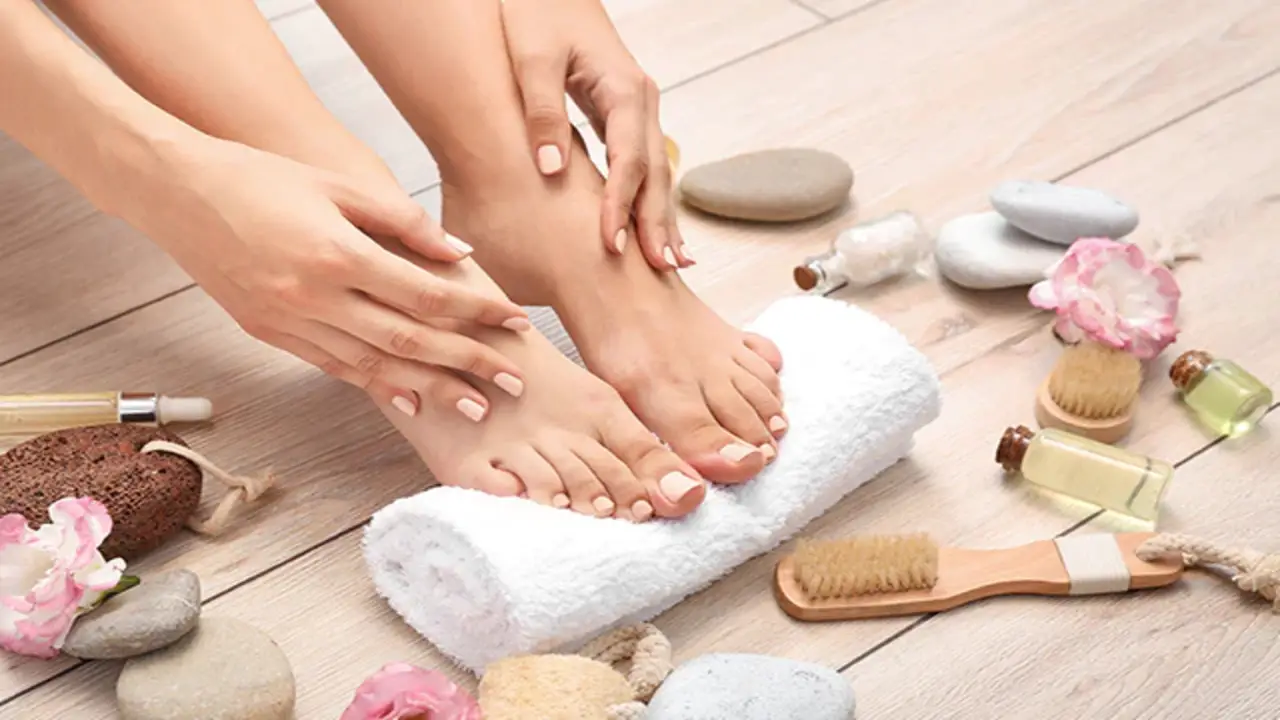
Regular foot care is crucial for promoting foot health and preventing foot problems. By taking care of your feet, you can lower the risk of injury, pain, and discomfort in your lower extremities. Proper foot care improves circulation, reduces swelling, and alleviates aches and inflammation. Regular foot care is essential for maintaining healthy feet and overall well-being. Here are some key reasons why:
- Prevention Of Foot Problems: Regular foot care helps prevent common foot issues such as calluses, corns, ingrown toenails, and fungal infections.
- Pain Relief: Foot pain can be debilitating and affect daily activities. Regular foot care, including proper trimming of nails and addressing any discomfort or pain, can provide relief and improve mobility.
- Improved Circulation: Massaging the feet during regular foot care routines helps stimulate blood flow, which promotes better circulation throughout the body.
- Early Detection Of Issues: Regular foot examinations allow for early detection of potential problems such as bunions, plantar fasciitis, or diabetic foot complications. This enables timely intervention and prevents further complications.
- Hygiene Maintenance: Proper cleaning, moisturizing, and drying of the feet during regular foot care routines help maintain good hygiene and prevent bacterial or fungal infections.
By prioritizing regular foot care, individuals can ensure that their feet remain healthy, comfortable, and free from any potential issues that may impact their overall quality of life.
Effective Foot Care Routines For Individuals Working Long Hours On Their Feet
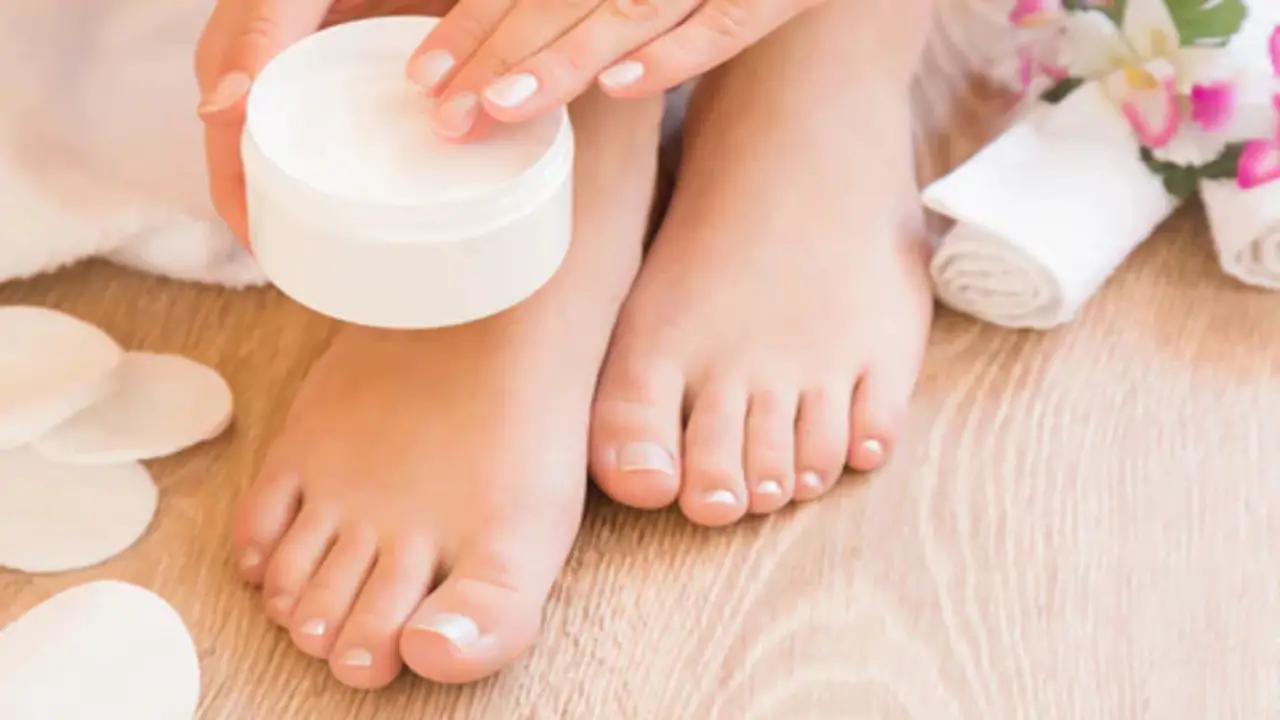
Take short breaks throughout the day to elevate your feet and improve blood flow. Incorporate foot exercises like toe curls or stretching to promote health and flexibility. For improved circulation and reduced swelling, consider wearing compression socks or stockings.
If you have flat feet or arch problems, shoe inserts or orthotics can support you. Moisturize your feet before bed with a foot lotion or cream to prevent dryness and cracked skin. By following these foot care routines, individuals working long hours on their feet can ensure better foot health and comfort. Here are ten effective foot care routines for individuals working long hours.
1.Examine Your Feet Regularly
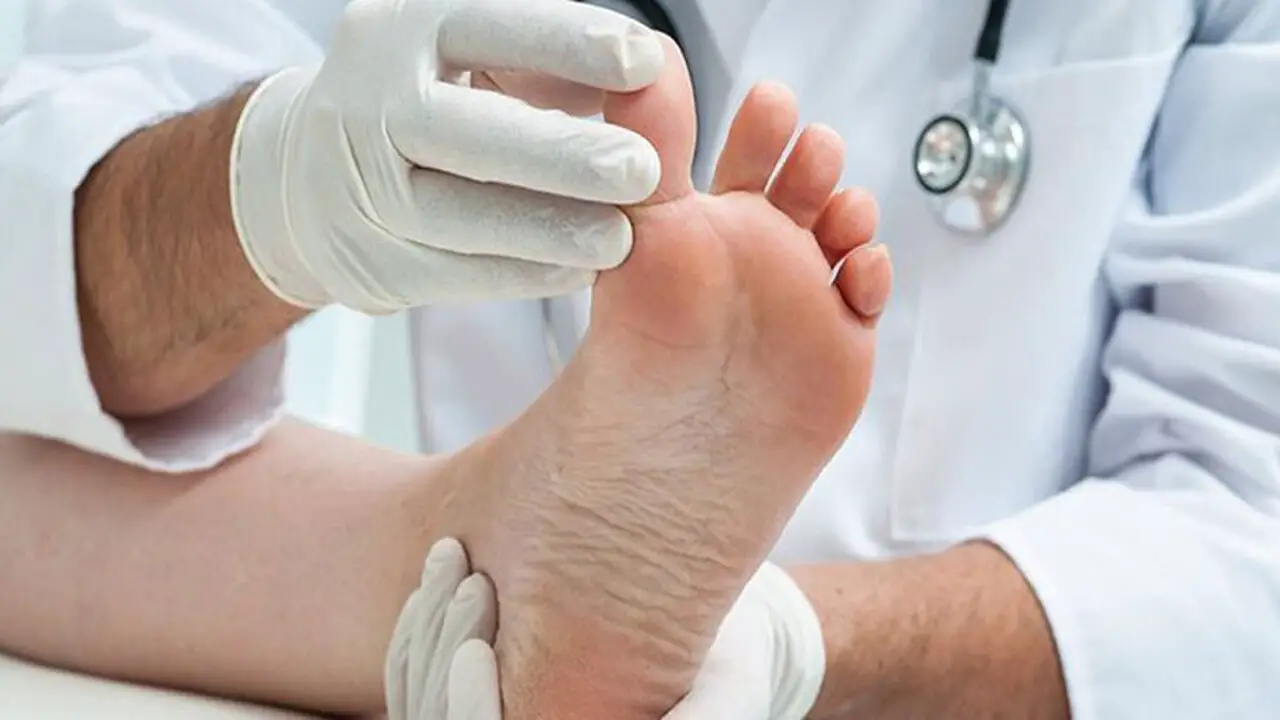
Regularly examining your feet is an essential part of a comprehensive foot care routine. By checking your feet daily, you can identify any cuts, blisters, calluses, or changes in skin colour that may require attention. It’s also important to look for signs of infection, such as redness, swelling, or pus.
Don’t forget to inspect your toenails for any abnormalities, including thickening, discolouration, or ingrown nails. If you notice any unusual foot problems, consulting a podiatrist for a proper diagnosis and treatment is recommended. By regularly examining your feet, you can take proactive steps to maintain their health and address any issues promptly.
2.Drink Plenty Of Water And Avoid Caffeine And Alcohol
Staying hydrated is crucial for maintaining the health of your feet, as it promotes proper blood flow and prevents dryness. When you work long hours, it’s even more important to drink plenty of water throughout the day. Adequate hydration can reduce swelling in your feet and decrease the risk of painful cramps.
On the other hand, excessive consumption of caffeine and alcohol can dehydrate your body, which can have negative effects on your foot health. It’s best to limit your intake of these substances to ensure optimal foot health and overall well-being.
3.Wear Comfortable Shoes That Protect Your Feet
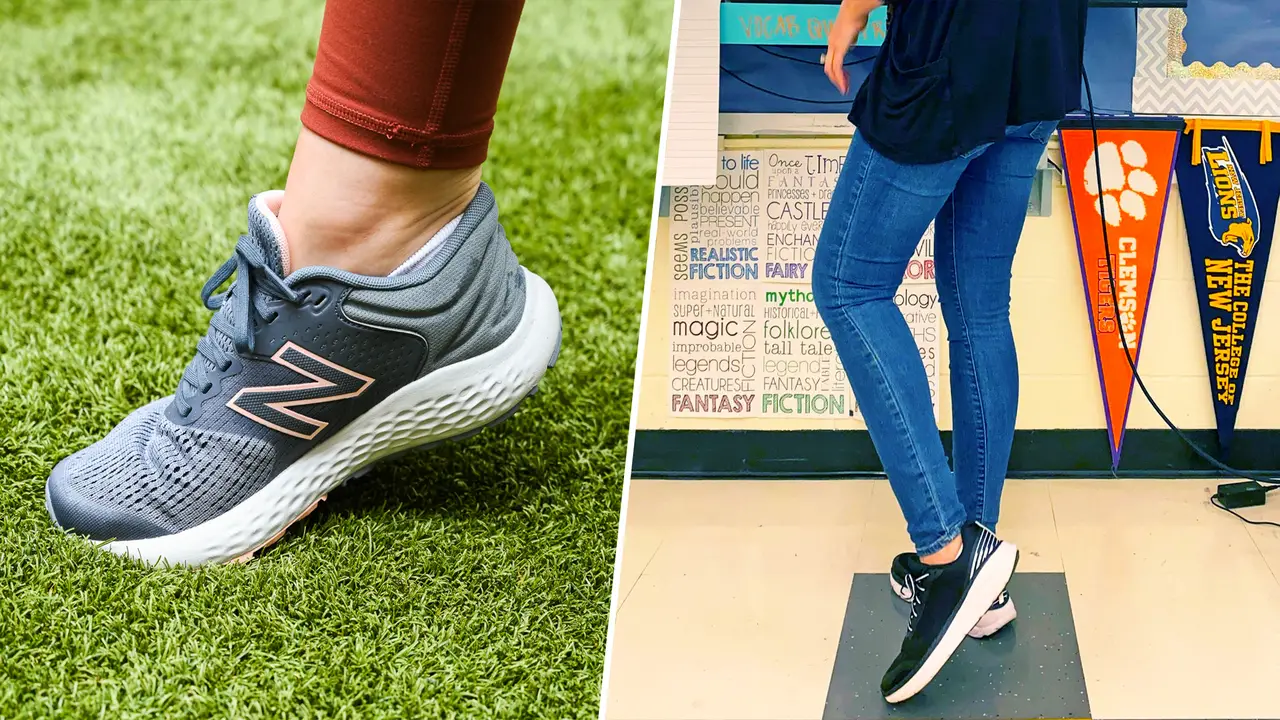
To ensure foot comfort, it’s important to wear shoes that fit properly and provide adequate support. Choose footwear that allows your toes to move freely and avoids tightness or discomfort. Look for shoes with good arch support and cushioning to reduce the risk of pain and provide stability.
High heels should be avoided as they can cause discomfort, blisters, and deformities. Consider using orthotic inserts or custom orthotics for additional support and alignment. Prioritizing comfortable shoes will protect your feet from unnecessary strain and promote overall foot health.
4.Take Breaks Every Hour Or So To Move Your Feet And Legs
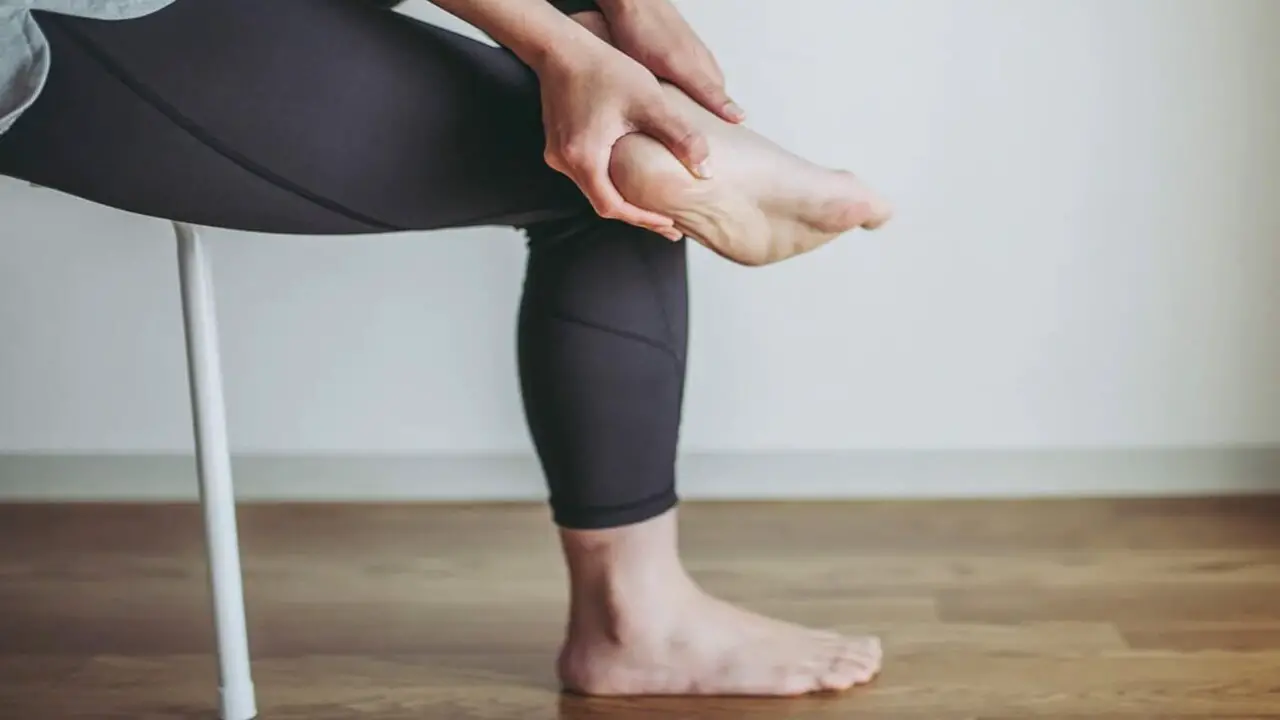
Throughout your long periods of work, it is essential to prioritize the health of your feet and legs. By taking regular breaks, approximately every hour, you can provide much-needed relief and prevent discomfort. During these breaks, stretch your feet and legs, promoting flexibility and reducing the risk of muscle tension.
Additionally, wearing comfortable and supportive shoes will go a long way in preventing foot pain and avoiding issues such as Achilles tendonitis. Keeping your feet clean and dry will also help to prevent infections, while applying lotion can maintain proper moisture levels. Lastly, elevating your feet when possible can reduce swelling, and gentle foot massages can improve blood flow and relieve tension.
5.Use Foot Cream Regularly
To maintain healthy feet while working long hours, it’s important to use foot cream regularly. Ensure you wash and dry your feet daily to keep them clean and bacteria-free. Wearing comfortable and supportive shoes will provide the necessary cushioning and reduce the risk of foot pain.
Take breaks throughout the day to stretch your feet and keep them limber. You can also soothe sore muscles by soaking your feet in warm water with Epsom salt. Don’t forget to use a pumice stone or foot file to remove dead skin, and apply foot cream regularly to moisturise your feet.
6.Washing Feet With Soap And Water
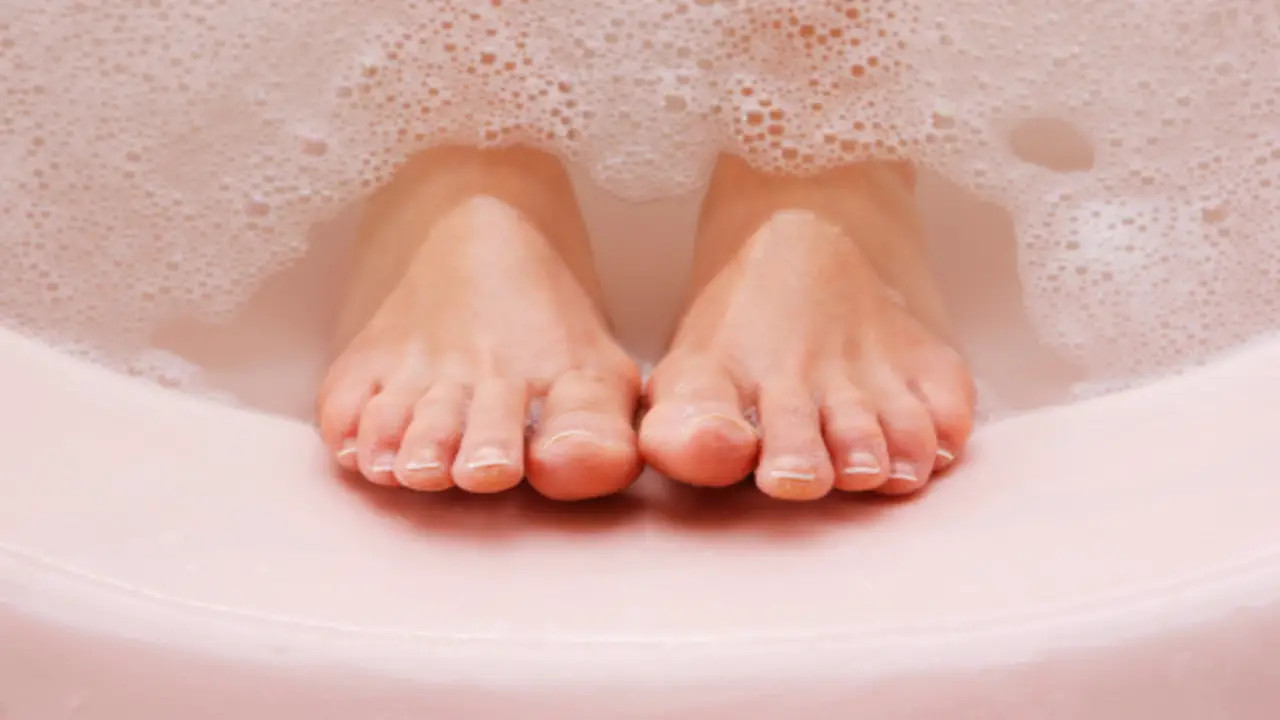
Regularly washing your feet with soap and water is crucial for optimal foot health. It helps to prevent various foot problems that can arise from long periods of standing or walking. When washing your feet, use warm water to prevent skin dryness.
Afterwards, ensure you dry your feet completely, paying close attention to the spaces between your toes, as dampness can lead to fungal infections. To keep your feet soft and prevent cracking, apply moisturizer regularly. Additionally, wearing clean, breathable socks made from natural materials and changing them often can help prevent moisture buildup.
7.Wrapping Feet In A Warm, Dry Towel
To relieve soreness and swelling after long periods of standing, you can soak your feet in warm water with Epsom salt. This can be followed by using a foot roller or massage ball to reduce tension and improve circulation. To keep your feet moisturized and prevent dryness and cracking, apply foot cream or lotion.
It’s also important to wear comfortable shoes with good arch support and cushioning. Remember to take breaks and stretch throughout the day to reduce strain and fatigue. Elevating your feet when sitting can further improve blood flow and reduce swelling.
8.Adding Epsom Salt To Water For Foot Soaking
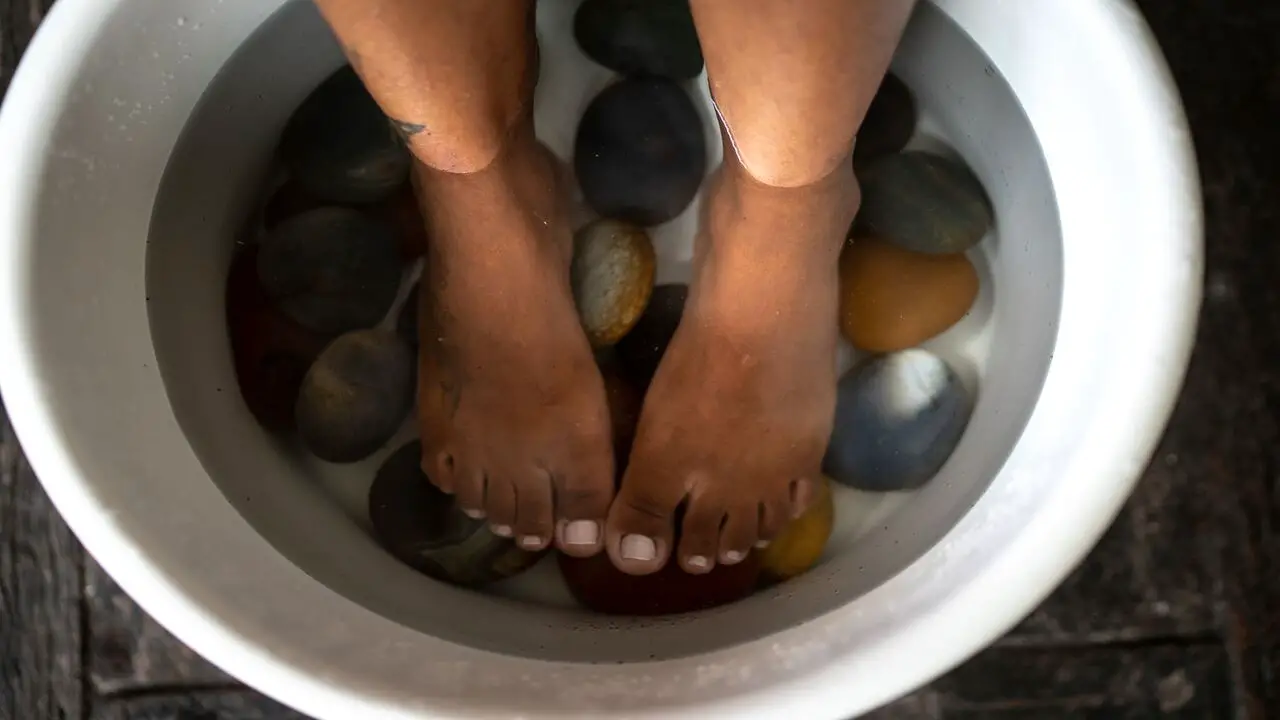
To alleviate swelling and soothe soreness, immerse your feet in warm water infused with Epsom salt. This therapeutic remedy promotes relaxation while providing pain relief. Additionally, pamper your feet by massaging them with a nourishing moisturizer, preventing dryness and cracks. Ensure optimal comfort by wearing shoes that offer excellent arch support, reducing foot fatigue.
If necessary, consider using orthotic inserts or custom-made orthotics to enhance stability and support. To improve circulation and combat stiffness, take regular breaks to stretch your feet and ankles. Furthermore, eliminate dead skin and calluses by gently exfoliating with a pumice stone or foot file.
9.Protecting Your Feet From Heat And Cold
To protect your feet from heat and cold, it’s important to wear appropriate footwear that offers support and protection. Make sure to take regular breaks to stretch and walk around to prevent long periods of pressure on your feet. Using foot powder or antiperspirant can help prevent moisture build-up and keep your feet dry.
After a long day, soaking your feet in warm water with Epsom salt or essential oils can help relax your muscles. Don’t forget to use lotion or moisturizer to keep your feet soft and prevent cracking. Lastly, giving yourself a foot massage can improve circulation and reduce swelling.
10.Taking Breaks For Foot Health
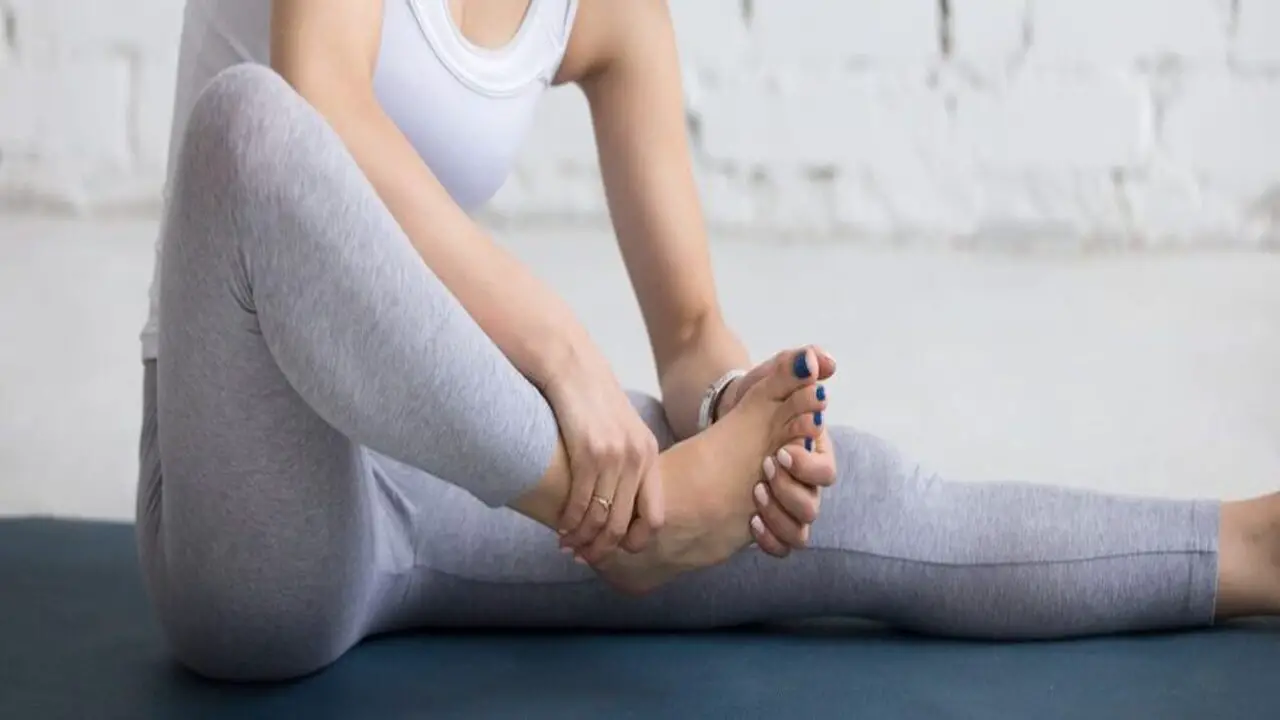
To maintain foot health while working long hours, it’s crucial to take breaks and care for your feet. Start by incorporating stretching exercises into your breaks to relieve tension in the feet and legs. Another important aspect is wearing comfortable and supportive footwear to provide adequate cushioning and prevent discomfort.
Elevating your feet whenever possible can help reduce swelling and improve circulation. Additionally, massaging the feet and applying moisturizer regularly can prevent dryness and calluses. Using orthotics or custom insoles can provide extra support and stability. Lastly, taking short breaks and walking around can further enhance circulation. By prioritizing these foot care routines, you can maintain healthy feet even during long work hours.
Addressing Common Foot Problems
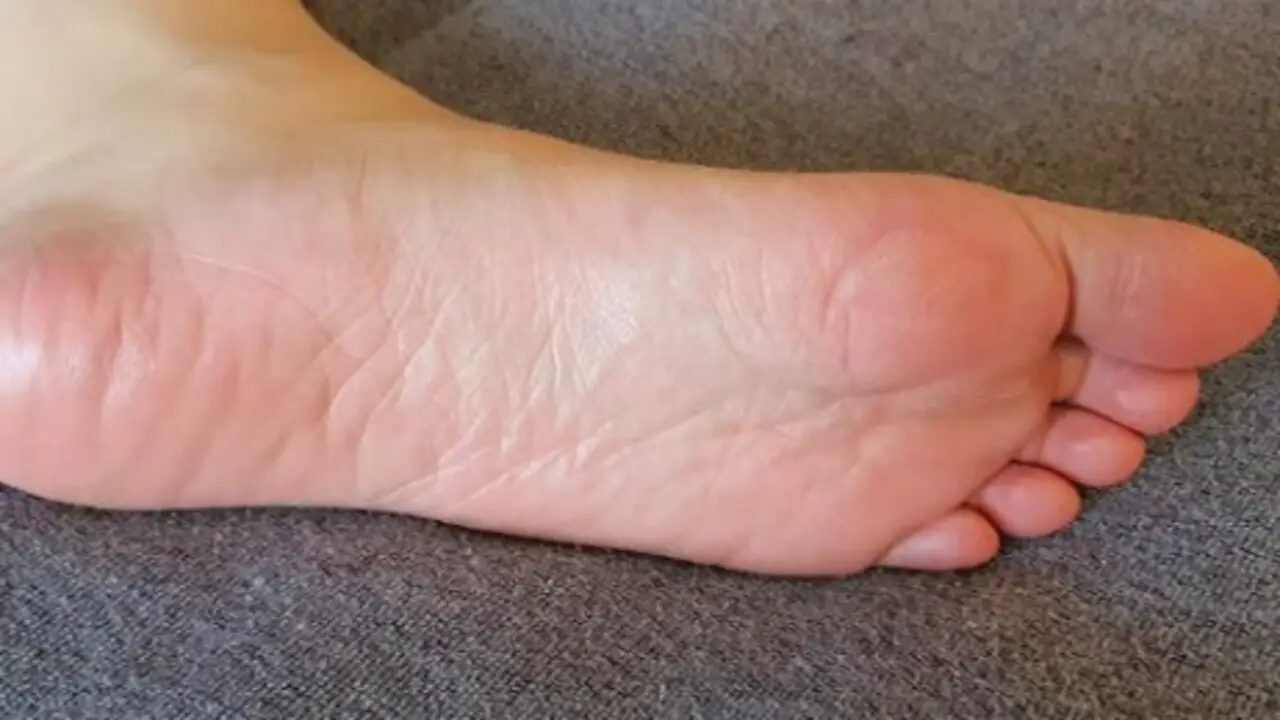
To maintain healthy feet, it’s important to address common foot problems that can arise from working long hours. Working long hours can take a toll on your feet, but with the right foot care routine, you can keep them happy and healthy.
Here are some common foot problems that individuals working long hours may experience, along with tips on how to address them:
- Foot Pain: If you’re experiencing foot pain, try soaking your feet in warm water with Epsom salt to help relieve inflammation. You can also use a foam roller or tennis ball to massage your feet and stretch the muscles.
- Blisters: To prevent blisters, make sure you’re wearing comfortable and supportive shoes that fit properly. If you get a blister, avoid popping it, as it can lead to infection. Instead, clean the area with antiseptic and cover it with a bandage.
- Sweaty Feet: Sweaty feet can lead to discomfort and odour. To keep your feet dry, wear moisture-wicking socks made of breathable materials like cotton or bamboo. You can also use foot powders or antiperspirant sprays specifically designed for feet.
- Calluses: Calluses often form due to friction or pressure on the skin. To soften calluses, soak your feet in warm water and gently exfoliate the area with a pumice stone or foot file. Moisturize afterwards to keep the skin hydrated.
Remember to listen to your body and give your feet regular daily breaks. If you have persistent foot problems or severe pain, it’s always best to consult a healthcare professional for further evaluation and treatment options.
Managing Corns And Calluses
To manage corns and calluses, start by soaking your feet in warm water with Epsom salt. This will help soften the hardened skin. Gently use a pumice stone or emery board to remove the dead skin, being careful not to overdo it. Moisturize your feet regularly with lotion or a moisturizing cream to prevent dryness.
It’s important to wear properly fitting shoes that provide adequate support to avoid friction and pressure on your feet. If corns or calluses become painful, it’s recommended to see a podiatrist for further treatment options.
Remedies For Sweaty Feet And Foot Odor
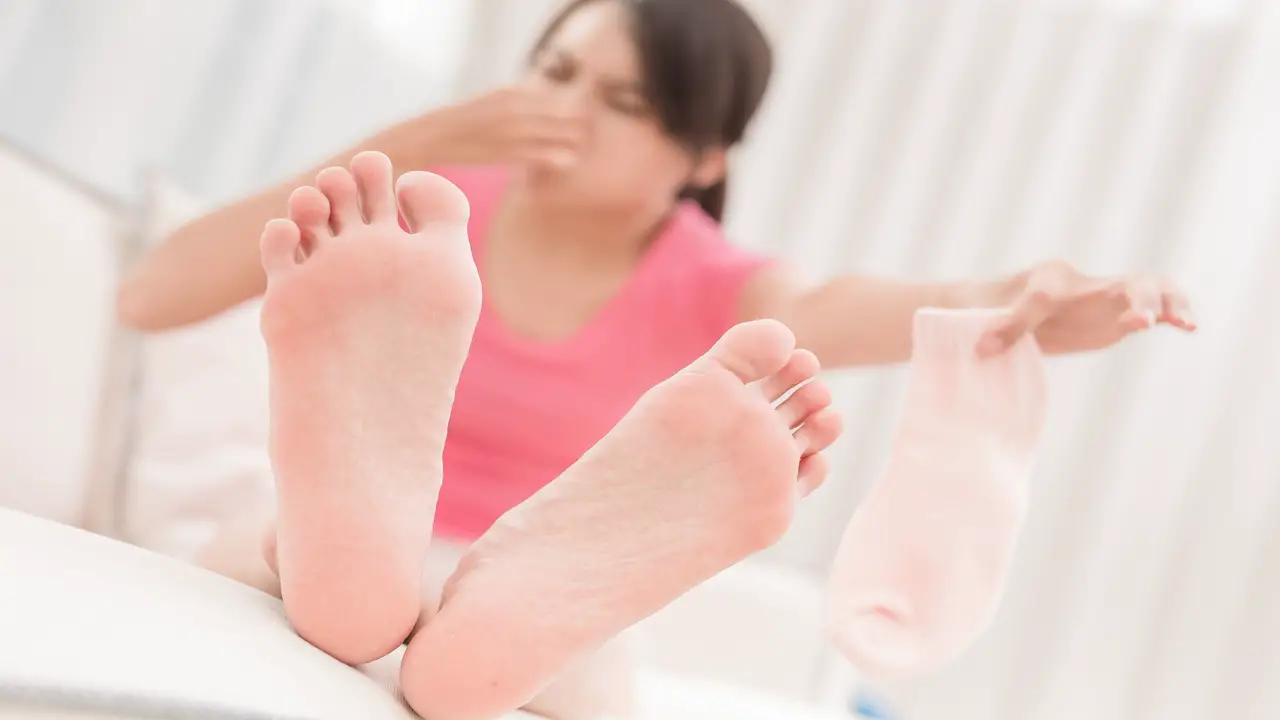
To combat sweaty feet and foot odour, it’s important to establish a regular foot care routine. Start by washing your feet daily, paying extra attention to areas prone to sweating, like between your toes. Consider using foot powders or sprays that contain ingredients like magnesium or baking soda to absorb moisture and neutralize odour.
Opt for moisture-wicking socks made of natural fibres and change them regularly throughout the day if your feet get sweaty. When choosing shoes, use breathable materials like leather or mesh to allow air circulation. If the foot odour persists, it’s best to consult a podiatrist who can recommend stronger treatments such as prescription-strength antiperspirants or foot soaks.
When Should You See A Podiatrist?
If foot pain persists despite home care, it may be time to consult a podiatrist. An evaluation is essential for persistent swelling, numbness, or tingling. Deformities like bunions or hammertoes could require professional treatment.
Knowing when to see a podiatrist is important for individuals working long hours who may be at a higher risk for foot-related issues. If you experience any of the following, it is recommended to seek professional help from a podiatrist:
- Persistent foot pain or discomfort that does not improve with rest or self-care.
- Swelling, redness, or warmth in the feet could be signs of an infection or inflammation.
- Numbness or tingling in the feet could indicate nerve damage or circulation problems.
- Visible changes in the shape or appearance of the feet, such as deformities or skin abnormalities.
- Difficulty walking or bearing weight on the feet due to pain or instability.
A podiatrist can assess your condition, provide a diagnosis, and recommend appropriate treatment options to address your specific foot care needs. It is always better to seek professional advice sooner rather than later to prevent further complications and ensure optimal foot health.
Conclusion
Taking care of your feet is crucial, especially if you work long hours on your feet. Incorporating a regular foot care routine can help prevent common foot problems and ensure that your feet stay healthy and pain-free.
Remember to examine your feet regularly, wear comfortable shoes, take breaks to move your feet and legs, and use foot cream to moisturise your skin. Additionally, address any common foot problems such as corns and calluses or sweaty feet and foot odour promptly.
However, if you experience persistent foot pain or notice any unusual symptoms, it’s important to consult with a podiatrist for a proper diagnosis and treatment. Prioritizing foot care will not only improve your overall well-being but also enhance your productivity and quality of life. If you read the above information on effective foot care routines for individuals working long hours you will be able to care for your foot regularly.
Frequently Asked Questions
1.How Often Should You Get Your Feet Checked?
Ans: It is important to prioritize regular foot check-ups. For healthy individuals, an annual foot check is recommended. However, if you have underlying health conditions like diabetes, more frequent checks may be necessary. Detecting foot problems early can help prevent complications.
2.How Do I Prepare My Feet For A Long Day At Work?
Ans: To prepare your feet for a long day at work, start by wearing comfortable and supportive shoes that fit well. Use cushioned insoles to reduce pressure on your feet. Before starting work, stretch your feet and toes to warm them up.
3.How Do You Survive A Long Shift On Your Feet?
Ans: To survive a long shift on your feet, prioritize comfortable shoes with proper support. Take breaks and sit whenever possible to alleviate stress on your feet. Use a foot roller or massage ball during breaks to release tension.
4.How Can I Protect My Feet When Standing All Day?
Ans: To protect your feet when standing all day, wear comfortable and supportive shoes that fit properly. Consider using insoles or orthotics for added support and cushioning. Take regular breaks to stretch your feet and walk around.
5.How Often Should You Soak Your Feet?
Ans: Soaking your feet once or twice a week is recommended. It can help relieve stress and pain after a long day of work. Enhance the benefits by adding Epsom salts or essential oils to the water.
